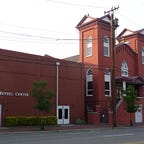Outreach
Third Street Bethel African Methodist Episcopal Church embodies Black liberation theology through its involvement in the community. However, to talk about the present, one must revisit the past. Members of this church can, and do, trace their ancestry back to their enslaved and formerly enslaved ancestors. The power in that lineage attains its fuel from the resistance and bravery necessary to visualize a religious experience that not only looks different but also cradles its members differently. The Church’s existence is rooted in love; love for one’s faith, one’s people, and one’s future. This dedication to one’s people yields something we are all familiar with without quite knowing it: FUBU; the idea of something made/created/continued for us, by us.
In alignment with this idea, the Church serves its community through a local soup kitchen, education, providing needed resources to vulnerable members, helping people attain vaccinations, and making sure locals do not have to struggle. (Jenkins 2021) Through these activities, the Church feeds its people in ways beyond literal and spiritual manifestations. These services provide each generation with security and safety nets not available to their ancestors; therefore, its very existence is an act of resistance. Care for one’s people in this manner alleviates their struggle with constant reminders that they do not exist alone or without help in this world. The Church then goes beyond its traditional scope, embodying Black liberation theology, because it prepares parishioners for the world and the discrimination, misinformation, and stigma they face in mainstream white society.
